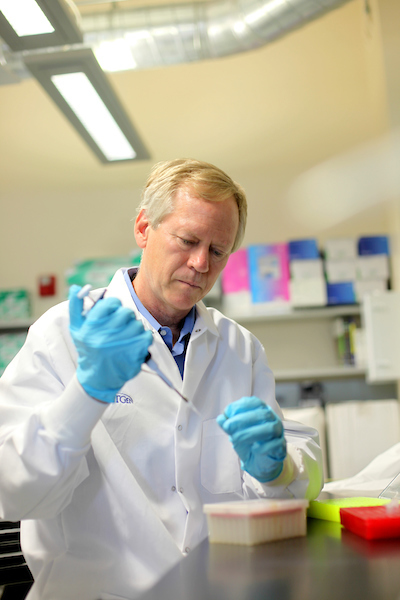By Kerry Bennett
Office of the Vice President for Research
A patented assay to diagnose Valley fever, developed by Northern Arizona University Regents’ Professor of Microbiology Paul Keim, was recently submitted to the U.S. Food and Drug Administration (FDA) by DxNA LLC, the company that licenses the technology. This important milestone, a critical step in taking a new diagnostic technology to market, will pave the way for the assay to be used to help physicians diagnose patients more quickly and, as a result, save lives.
Valley fever, a potentially deadly, dust-borne fungal disease, is endemic to Phoenix and Tucson and is spreading throughout the arid regions of North and South America. It is an infection caused by the microscopic fungus Coccidioides, a pathogen that lives in desert soils and typically enters the body through the lungs. An estimated 150,000 Americans are infected annually by Valley fever, and as many as 500 die each year.
The assay represents a significant improvement in the rapid diagnosis of the disease. Testing for Valley fever is conducted by growing the fungus in a laboratory, which can take up to 21 days. Because the new test is performed directly on the patient specimen, it provides physicians with test results the same day, considerably reducing the time to begin treatment. This new genetics-based test can precisely identify both strains of Valley fever: Coccidioides posadasii, found in Arizona, New Mexico, Texas and much of Latin America; and Coccidioides immitus, found in California, Washington and Baja, Mexico.
NAU and the Translational Genomics Research Institute (TGen) were jointly awarded a U.S. patent for the technology in 2016, exclusively licensing it to Utah-based DxNA. DxNA incorporated the test into its proprietary GeneSTAT® System and GeneSTAT® Coccidioides Assay and successfully conducted clinical trials of the test at centers in Arizona, New Mexico and California. Keim worked closely with DxNA throughout the commercialization of the assay, providing clinical perspective and assisting with the clinical trials.
“Teaming scientists with top business entrepreneurs can lead to great products,” Keim said.
DxNA recently announced it submitted the GeneSTAT System and GeneSTAT Coccidioides Assay to the FDA as a 510(k) premarket notification. Once DxNA receives FDA clearance, the company plans to make the Valley fever test commercially available to hospitals and clinics.
“The FDA 510(k) application is the penultimate step in a long process that started in a business meeting at PathoGene, LLC, now part of DxNA,” Keim said.
Keim led development of the genomics approach by searching the Coccidioides genome for highly repeated DNA sequences, identifying a novel repeated DNA sequence and converting it to the Polymerase Chain Reaction-based diagnostic test for which DxNA is seeking FDA approval.



